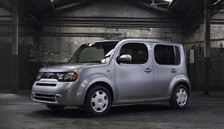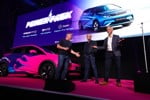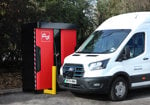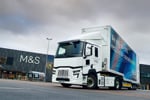For a car manufacturer with no models in the core lower and upper-medium segments, Nissan is doing surprisingly well in the UK.
It ended 2008 with 66,336 registrations (down 0.1% on 2007), with fleet sales accounting for 38,399 units.
In the current financial climate, this performance is impressive, especially when you look at Nissan’s product line-up.
Since the demise of the core Almera and Primera ranges in 2006, Nissan has relied upon crossover and niche models to offer to corporate customers – only the Micra and X-Trail sit in recognised market segments.
And this approach will continue as the manufacturer introduces yet more vehicles which defy the traditional market definitions.
James Douglas, fleet sales director at Nissan, said: “When we exited certain segments with Almera and Primera it created something of a hiatus, with us offering nothing in the middle.
“A lack of core fleet models does hamper us going into some companies. However, overall this has helped us in brand positioning terms and people think differently about Nissan now compared to a few years ago.
"We can’t compete head-on with volume, especially in the upper-medium sector which has been ripped apart by the premium brands.
"We are out of that now. Instead, we have a stylish, customer-need led product offering.”
That offering will grow later this year when the Cube is launched in October.
his quirkily-styled city car has gained something of a cult following since it went on sale in Japan 10 years ago, and it has now been confirmed for the UK in October with a choice of 1.5-litre diesel and 1.6-litre petrol engines.
Douglas added: “The Cube is a car which people will either love or hate.
"It has a very specific look – very functional, very stylised. It could be iconic or it could become quickly forgotten – this will be decided by the customer.
"I love that feeling – it’s the same as the risk we took with the Qashqai.
“I see opportunities for the Cube in the fleet sector – it’s a car for companies that want to make a statement.
 "We’ve been talking to one fleet about it – their cars are branded so the Cubes will send out a strong message.”
"We’ve been talking to one fleet about it – their cars are branded so the Cubes will send out a strong message.”
Another addition to the Nissan line-up, though not until next year, will be another crossover vehicle based on the Qazana concept revealed at the Geneva Motor Show.
Another radically styled model, the production version will sit somewhere near the supermini segment and, according to Nissan, the concept is around 85% production ready.
This focus on small, segment-busting models, allied to a drop in volumes, has helped Nissan to boost its residual value performance.
Douglas said: “Every action we take in fleet is with one eye on its future impact, in terms of residuals and brand protection.
“We have an RV committee and they have various action points.
"Five years ago, we were very heavily involved in short-cycle business, which meant we had to deal with a lot of under 12-month-old vehicles coming back to us.
"This was damaging residuals so we took action to cut this business.
“As a result, our volumes fell but we are now growing in areas we want to grow in.
"Our sales to leasing companies and end-user fleets are up, while rental sales are down.
"This year we will get to our final resting point in terms of our sales mix.”
He added: “We have taken a bitter pill in volume terms. Our interest is in organic growth – we don’t want to force the volume, which we have done in the past.
"Obviously in the current climate we expect volume to fall this year because of the market conditions and pulling out from certain areas.”
Awards success
Nissan scooped two titles at the 2008 Fleet News Awards – Best Working Vehicle for the Navara and Best Small Family Car for the Qashqai.
Douglas said: “Qashqai can’t do anything wrong and it is the mainstay of our fleet sales (10,226 units including the recently-launched +2 version). It is also opening doors to us.
It has been hugely successful and we haven’t had to push the car.”
Qashqai sales amounted to nearly a third of Nissan registrations in the UK last year, despite demand across Europe limiting supply here.
This led to three to four-month lead times, but due to the current market this is now down to a few weeks.
Market forces also saw Navara sales fall by more than 40% in 2008.
Douglas added: “The pick-up segment fell apart, but we still maintained the number one slot.”
Electric future
The global crunch has seen Nissan CEO Carlos Ghosn’s mid-term plan ripped up, with just two key pillars remaining – quality in all areas of the business and electric vehicles.
Douglas said: “Carlos Ghosn wants us to be a leader in electric vehicles by 2012 and we have just signed a joint venture with NEC in Japan for developing batteries which are half the size of the current units.
"By 2010 we will have electric vehicles in Japan and the US, by 2011 in Europe and globally by 2012.
"We are talking to the UK government about the recharging infrastructure in the UK.”
Nissan (and its Alliance partner Renault) is committed to a whole range of zero-emission electric cars and LCVs, and the next electric vehicle it displays at a motor show will be a car it will build.
Renault has already announced that it hopes to have a few thousand electric vehicles on trial in London by the 2012 Olympics.
















Login to comment
Comments
No comments have been made yet.